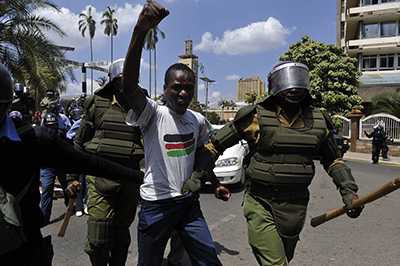The Kenyan press is being caught in the crossfire as authorities seek to strengthen defenses against terrorists. On December 19, Kenya’s president signed into law a security bill that has the power to stop the press covering terror attacks. The government has also recently criticized the media over allegations that special units are carrying out extra-judicial killings, and a local journalist who reports on security issues has gone into hiding after receiving threats.
Provisions in the Security Laws (Amendment) Bill 2014 allow Kenyan security forces to intercept communications and imprison journalists for covering anti-terrorism investigations and operations, according to news reports. Journalists will now have to seek permission from the police before reporting on such events, and those found to have undermined investigations could face a three-year jail term and heavy fines, according to news reports. The reach of the bill includes penalties for outlets that publish pictures of dead or injured victims without police permission, and extends to information posted on social media as well as in the traditional press.
The Media Council of Kenya and other Kenyan press associations denounced the initiative in a joint statement released before the bill was approved and signed. “Terrorism should not affect the importance of freedom of expression and information in the media as one of the essential foundations of a democratic society,” Media Council of Kenya chairman Peter Wakoli said in the statement.
The Parliamentary Committee on National Security and Administration sent the contentious security amendment bill to the assembly after 64 people were killed in two attacks in Mandera, a county bordering Somalia, in November and December, local journalists told me. The attacks led to members of parliament being recalled from their Christmas break so they could debate the bill on December 18.
This tougher government stance towards the press appears to be reflected in its response to the documentary “Inside Kenya’s Death Squads,” produced by Al-Jazeera in Qatar and broadcast on December 7. The documentary implicated the Kenyan security forces and foreign governments in extrajudicial killings. It included interviews with people that Al-Jazeera alleged were officers from special units who claimed the killings were part of anti-terrorism efforts and had backing from the British and Israeli governments. Although the documentary was not aired in the country, Kenyans were able to watch it via satellite TV and online.
The government denied the claims and, in a press release, said it had instructed the relevant authorities to begin investigations on whether charges could be brought against those involved in the documentary. It did not specify which authorities were investigating.
The claims made by Al-Jazeera have been repeated elsewhere in the media, but this is the first time the government has ordered an investigation into whether it is possible to bring charges against a network. The claims were also made in a two-part series in September 2013 by Kenya’s investigative program “Jicho Pevu” and the English-language version, “Inside Story,” and in a report published by The Associated Press on December 5, 2014.
In an interview with Al-Jazeera in response to the documentary, Information, Communications and Technology Cabinet Secretary Fred Matiangi denied the allegations. The ministry’s principle secretary, Joseph Tiampati, said a complaint has been filed with the statutory media regulator, the Media Council of Kenya, about the conduct of the Kenyan and international Al-Jazeera bureaus, news reports said.
Phil Rees, executive producer of Al-Jazeera’s investigative journalism department, stands by the accuracy of the network’s journalism. “We would rather [the government] addressed the content of the investigation rather than flail out at the messenger,” he told me. “It is a tragedy if the politics of fear are now used under the guise of a security bill to put fear into the hearts of journalists,” Rees added.
The reaction to the Al-Jazeera documentary has led to Mohammed Ali, the investigative reporter for the “Inside Story” series, to go into hiding. Local journalists told me that Ali received anonymous death threats on Twitter and in phone calls after the documentary was aired. It is not the first time Ali has been threatened for his coverage of security operations. Ali and his colleague John-Allan Namu received death threats via anonymous calls and on social media in April last year for their investigations into a helicopter crash that killed Interior Minister George Saitoti. The then Inspector-General of Police David Kimaiyo also threatened to arrest the two reporters during a press conference in October 2013 for their critical coverage of the security operations during the Westgate Mall terror attack in Nairobi.
The Kenyan human rights body, National Coalition of Human Rights Defenders, issued a statement December 11 calling on authorities to investigate and prosecute those behind the death threats. “We are concerned that certain social media commentators are associating the journalistic research by Al-Jazeera with Mohammed Ali and resorted to social media platforms to malign his name and send him threatening messages,” the statement said.
Despite the concerns of the press, the Media Council of Kenya, and a raucous opposition in parliament against the bill on December 18, it has been signed into law through the ruling party’s majority. Once it comes in to effect, extensive reporting on attacks, like the coverage of the Westgate Mall attack, and reports questioning Kenya’s anti-terror tactics, could be quashed. With the law’s harsh penalties it will be easy for the government to curb any criticism of security measures that are made in the press or on social media.
